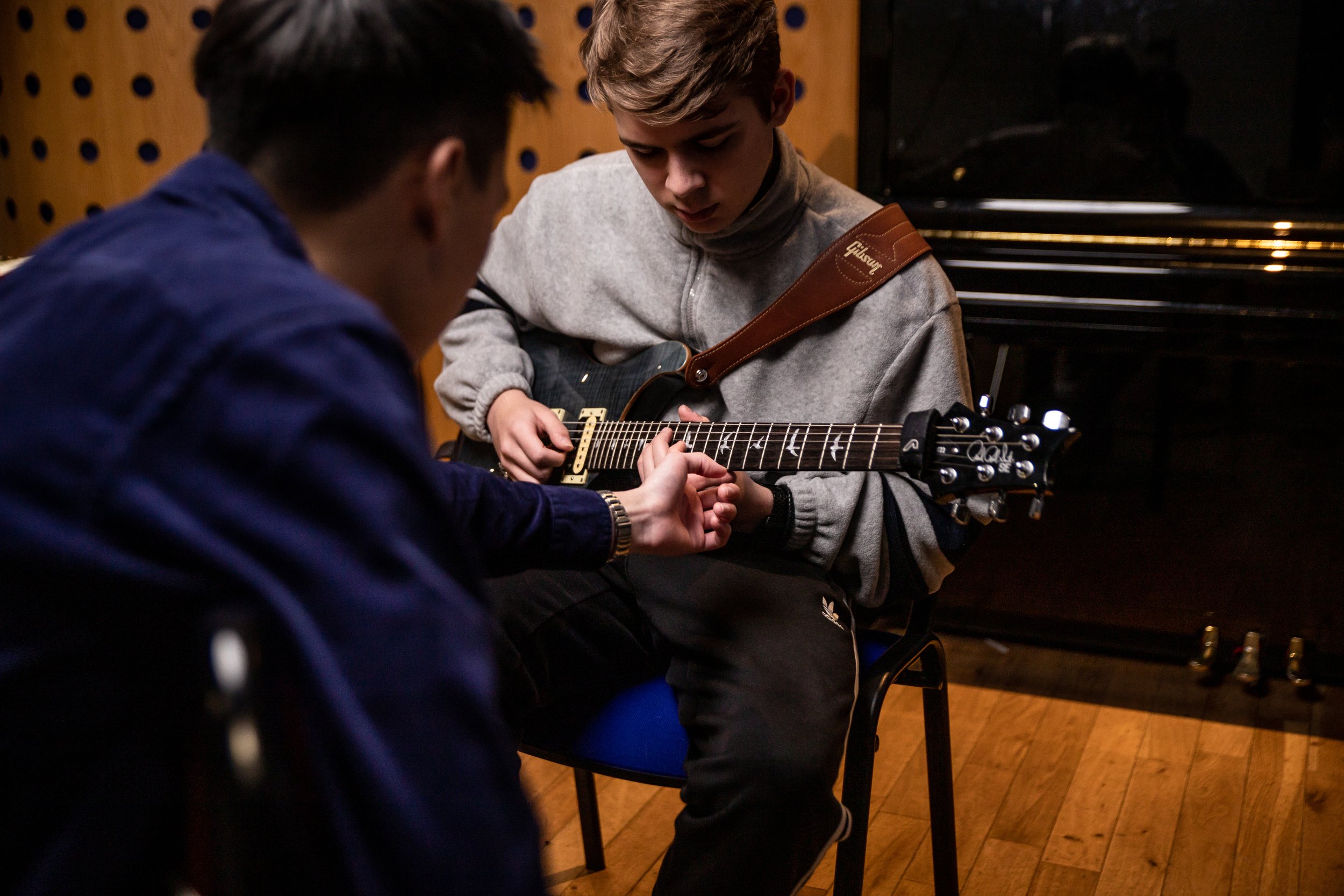
MY TEACHING METHODOLOGIES
My fundamental approach to teaching the guitar using a set of specific methods involving singing, playing, and applying in context.
Methodology
Methodology is the overall approach a teacher takes to teach their students in the most effective way possible. Some methodologies are common while some are unique and preferred by certain teachers, honed and crafted after years of teaching. Here are some of my core tried-and-tested methodologies that I have learnt and implemented in my own learning journey. These have helped me and surely helps my students too.
Master-Apprentice Approach
As your mentor, I provide personalized guidance, ensuring a transformative musical journey where traditional wisdom merges seamlessly with contemporary techniques. In this intimate setting, you're not just a student; you're an apprentice, learning the guitar under a master's careful guidance. The whole learning process is customized to your bespoke needs, with each learner being treated on a case by case basis.
-
Learning customised to bespoke needs, treated on a case-by-case basis
Two-way interaction rather than one - asking questions, playing together etc
Achieve goals sooner at a high standard
Song Analysis
Uncover the artistry behind every song through in-depth song analysis. Dissect melodies, unravel harmonies, and delve into the nuances of each song. Together, we'll explore the underlying structures, unlocking the secrets that breathe life into the music. Elevate your playing with a deeper understanding of the songs you love, and let's embark on a musical journey that goes beyond the surface.
-
Look at music from a top level perspective (understanding both macro and micro)
Improve general musicianship as you study more than just the guitar parts
Become better at other roles of songwriter/composer/arranger/producer
3 Birds 1 Stone
Learn scales, fretboard and theory together in a holistic and comprehensive manner where one is intrinsically related to another. Another example is to play along with recordings during the transcription process which greatly improves your time feel and groove since you are playing with the actual artists rather than a backing track or a click.
-
Make your practice more efficient
Tackle different challenges effectively
Improve the planning aspect to your practice with some creativity
Deep Listening
Deep listening is a musical discipline that transcends the ordinary. It leads to attentive detail, reshaping perspectives, and cultivating a refined taste for sound. Beyond mere instruction, it serves as a powerful tool to enhance ear training, fostering the development of keen ears that strengthen the overall learning experience. Deep listening is not just a skill but a gateway to a profound musical understanding.
-
Enhance enjoyment of music
Improve ears to learn songs more effectively
Repetition leads to better memory
Guitar Workouts
Much like working out at the gym, these practices are specific to this instrument, giving you the command and control that is needed to become a strong and confident guitarist. Diving into the details of the position of both hands and where the thumb should rest, navigating across the fretboard learning all the notes, building finger stamina, and much more.
-
These exercises are guitar-specific
Makes practising the instrument more interesting
Room for creativity and putting your own spin on it, making it work for you
Innovative Notation System
Make musical learning easy to follow and understand with an innovative notation system designed to simplify complexities and accelerate your guitar journey. Say goodbye to traditional hurdles and embrace a system that propels your understanding, making each lesson an enjoyable exploration of music.
-
Play popular riffs which are simplified
Various memorable positions and shapes
Be able to communicate or record musical ideas
Transcription
Transcription is a specific method of learning music by ear. This process involves singing and vocalising musical phrases, finding and playing them on the guitar, then putting that knowledge to practical use by applying and using it in different contexts. Transcription will ultimately broaden your musical vocabulary, making your musical language more stylistically convincing, while improving playing abilities on the instrument as well as development in ear training.
-
Build your own ‘lick library’, confidently speaking the language of music
Build up a comprehensive repertoire of songs and standards
Deeply understand the music through rigorous study
Stylistic Crossovers
Imagine comparing Santana’s Europa compared to jazz standard Autumn Leaves, which are two songs in different styles. In what ways are they similar? In what ways are they different? In my lessons, you will learn to find and analyse these tunes in terms of melody, harmony, rhythm. This method opens up new horizons and offers better understanding of styles.
-
Understand stylistic components
Dig into some musical history
Widen knowledge of artists and repertoire
Personalised Roadmap
Embark on a musical journey crafted just for you. Tailored to your unique goals and skill level, your personalised roadmap ensures each lesson is a purposeful step forward. Together, we navigate a path that resonates with your musical aspirations, making learning an individualized and fulfilling experience. Let's map out your personalized route to guitar excellence.
-
See exactly where you are in relation to your goals
Know exactly what you need to get there
Regularly review progress to optimise the practice


